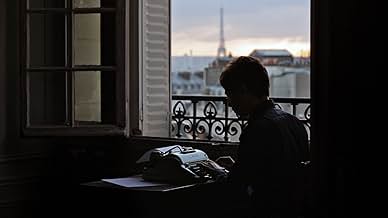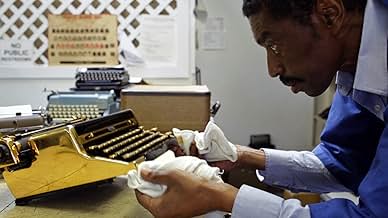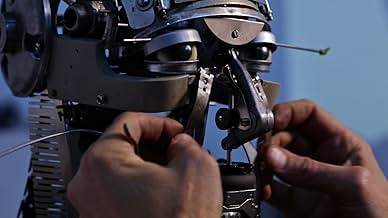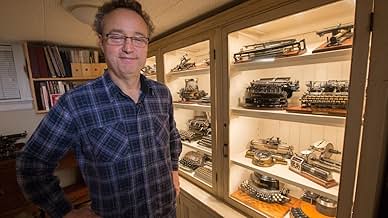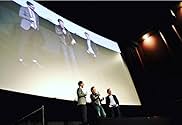IMDb RATING
7.3/10
1.1K
YOUR RATING
California Typewriter is a story about people whose lives are connected by typewriters. The film is a meditation on creativity and technology featuring Tom Hanks, John Mayer, Sam Shepard, Da... Read allCalifornia Typewriter is a story about people whose lives are connected by typewriters. The film is a meditation on creativity and technology featuring Tom Hanks, John Mayer, Sam Shepard, David McCullough and others.California Typewriter is a story about people whose lives are connected by typewriters. The film is a meditation on creativity and technology featuring Tom Hanks, John Mayer, Sam Shepard, David McCullough and others.
- Awards
- 3 wins & 5 nominations total
- Director
- Writer
- All cast & crew
- Production, box office & more at IMDbPro
7.31.1K
1
2
3
4
5
6
7
8
9
10
Featured reviews
A Return To Analog
One of the big reasons that "California Typewriter" showed up on my radar was likely because I happened to be reading a book at the same time called "Revenge of Analog". That book describes a movement back towards things such as records, paper, board games, and other physical (not digital) forms of leisure and commerce. That is the main theme of "California Typewriter" too...only focusing on the device listed in the title.
This documentary basically focuses on a number of different human interest stories involving a piece of technology largely thought "obsolete": the typewriter. From Tom Hanks' typewriter collection to the actual California Typewriter story, to a sculpture artist and and a collector looking for his coup de grace (and even a little history thrown in), this doc attacks the typewriter's story from nearly every angle.
Even above the human stories, though, is the notion present throughout the entire doc of that "return to analog" of sorts. As technology marches on, sometimes we don't stop to evaluate whether the physical experience of creation needs to take a back seat to the ease of creation. Don't get me wrong...I'm not exchanging my iPhone for a flip phone, nor am I turning in my MacBook for a desktop PC. I'm no Luddite. But it is a fascinating idea for me (old enough to remember a time before the Internet and mobile everything)...this notion that sometimes, say, the act of typing something on a physical device might be more satisfying than the ease of a word processor.
So, even though I'm not really "into" typewriters (I can honestly say I've never used one in my life!), I can say that this doc fascinated me and connected with me on a nostalgic, but also intellectual level. A return to analog devices may not be for everyone, but docs like this prove that the newest technology may not be for everyone, either. There is room for both, and even a mixture of both.
This documentary basically focuses on a number of different human interest stories involving a piece of technology largely thought "obsolete": the typewriter. From Tom Hanks' typewriter collection to the actual California Typewriter story, to a sculpture artist and and a collector looking for his coup de grace (and even a little history thrown in), this doc attacks the typewriter's story from nearly every angle.
Even above the human stories, though, is the notion present throughout the entire doc of that "return to analog" of sorts. As technology marches on, sometimes we don't stop to evaluate whether the physical experience of creation needs to take a back seat to the ease of creation. Don't get me wrong...I'm not exchanging my iPhone for a flip phone, nor am I turning in my MacBook for a desktop PC. I'm no Luddite. But it is a fascinating idea for me (old enough to remember a time before the Internet and mobile everything)...this notion that sometimes, say, the act of typing something on a physical device might be more satisfying than the ease of a word processor.
So, even though I'm not really "into" typewriters (I can honestly say I've never used one in my life!), I can say that this doc fascinated me and connected with me on a nostalgic, but also intellectual level. A return to analog devices may not be for everyone, but docs like this prove that the newest technology may not be for everyone, either. There is room for both, and even a mixture of both.
Fascinating
I stumbled over this documentary and was soon captured. Perhaps because I recalled 10-year-old me beginning an unwritten novel on mother's new Smith Corona portable and 14-year-old me banging on clunky manuals in middle school typing classes. I suspect that for many of the collectors featured in this show, now-impractical devices trigger nostalgic yearnings for times when life seemed less complicated and more enjoyable.
Filmmaker Doug Nichol offers both recognizable celebrities and little-known folks, each with their own level of interest in, or obsession for, fading technology. Another juxtaposition involves people preserving outdated machines and a sculptor deconstructing them to give machine parts new life in unique art forms.
As the program evolves, it becomes less about machines and more about the people who treasure them.
Filmmaker Doug Nichol offers both recognizable celebrities and little-known folks, each with their own level of interest in, or obsession for, fading technology. Another juxtaposition involves people preserving outdated machines and a sculptor deconstructing them to give machine parts new life in unique art forms.
As the program evolves, it becomes less about machines and more about the people who treasure them.
history, nostalgia, creativity
Greetings again from the darkness. QWERTY. Chances are you recognize that from your laptop keyboard, and have never thought about the origin or design reason. This is just one of the fascinating topics in the surprisingly interesting and entertaining documentary from Doug Nichol (former music video guru for Aerosmith, Lenny Kravitz, Sting, and The New Kids on the Block).
Did you know there are folks who collect and still use typewriters? Well there are, and you've even heard of some of them: Tom Hanks, Sam Shepard, David McCullough and John Mayer. We hear from each of these as they describe their connection to the "old school" way of producing text on a page.
Mr. Nichol began with the idea of making a short film focusing on a small typewriter repair shop in Berkeley. As the story evolved, he learned of the many facets associated with the community of typewriter enthusiasts those who refuse to give up the old way simply because a new way exists. There is history. There is nostalgia. There is a link to creativity. The film explores all of this and more.
Christopher Latham Sholes was a believer in Women's Rights in the 1800's, and his invention of the typewriter was to create more job opportunities for women. His prototype looked more like a piano, and due to a lack of investor interest, he finally had to sell to Remington in order to get production and marketing. By 1890, there were 60 manufacturers of typewriters, and the Sholes and Glidden model remains a gem of any collection even today.
It's bittersweet to see the recently deceased Sam Shepard and hear him explain how he never got along with a computer screen, but loves the feel and sound of his typewriter. He created some of the most marvelous plays ever written, and compares loading the paper to 'saddling a horse', and notes the sound of typing has a "percussion about it".
John Mayer recalls seeing Bob Dylan "playing" a typewriter as he wrote his songs, and has since made it apart of his own songwriting process. An inordinate amount of time is spent with Mayer on screen, but it does make the point that even the generation raised on technology can find value in an object that was once an office staple, and is now a mere relic to most. Writer David McCullough claims the typewriter is the only way he can write, and Tom Hanks seems to truly enjoy talking about his typewriter obsession, and how he spends time each day typing out thank you notes and correspondence.
The repair shop is the heart of the story, and we continually come back to Ken Alexander as he lovingly restores each machine that comes in. It's with a bit of irony that we watch Ken and the store owner Herb come to realize that they must rely on today's technology of websites and social media as a last hope for survival.
In stark contrast to Ken bringing typewriters back to life, we see modern sculptor Jeremy Mayes as he scavenges for typewriter parts for his latest piece. And in an odd twist, we meet a group who makes music with typewriters and actually perform classic songs with their own vibe.
Nostalgia has brought back vinyl records, and there is a community of folks who believe the typewriter revolution is underway. The rationale is that technology is now ruling our lives and we need to step back and get in touch with what is real and produce tangible results – not just use up storage on a hard drive. While we may not be convinced that "the revolution is typewritten" (from The Typewriter Insurgency Manifesto), the film is actually thought- provoking as it tracks and connects humans-machines-technology.
Did you know there are folks who collect and still use typewriters? Well there are, and you've even heard of some of them: Tom Hanks, Sam Shepard, David McCullough and John Mayer. We hear from each of these as they describe their connection to the "old school" way of producing text on a page.
Mr. Nichol began with the idea of making a short film focusing on a small typewriter repair shop in Berkeley. As the story evolved, he learned of the many facets associated with the community of typewriter enthusiasts those who refuse to give up the old way simply because a new way exists. There is history. There is nostalgia. There is a link to creativity. The film explores all of this and more.
Christopher Latham Sholes was a believer in Women's Rights in the 1800's, and his invention of the typewriter was to create more job opportunities for women. His prototype looked more like a piano, and due to a lack of investor interest, he finally had to sell to Remington in order to get production and marketing. By 1890, there were 60 manufacturers of typewriters, and the Sholes and Glidden model remains a gem of any collection even today.
It's bittersweet to see the recently deceased Sam Shepard and hear him explain how he never got along with a computer screen, but loves the feel and sound of his typewriter. He created some of the most marvelous plays ever written, and compares loading the paper to 'saddling a horse', and notes the sound of typing has a "percussion about it".
John Mayer recalls seeing Bob Dylan "playing" a typewriter as he wrote his songs, and has since made it apart of his own songwriting process. An inordinate amount of time is spent with Mayer on screen, but it does make the point that even the generation raised on technology can find value in an object that was once an office staple, and is now a mere relic to most. Writer David McCullough claims the typewriter is the only way he can write, and Tom Hanks seems to truly enjoy talking about his typewriter obsession, and how he spends time each day typing out thank you notes and correspondence.
The repair shop is the heart of the story, and we continually come back to Ken Alexander as he lovingly restores each machine that comes in. It's with a bit of irony that we watch Ken and the store owner Herb come to realize that they must rely on today's technology of websites and social media as a last hope for survival.
In stark contrast to Ken bringing typewriters back to life, we see modern sculptor Jeremy Mayes as he scavenges for typewriter parts for his latest piece. And in an odd twist, we meet a group who makes music with typewriters and actually perform classic songs with their own vibe.
Nostalgia has brought back vinyl records, and there is a community of folks who believe the typewriter revolution is underway. The rationale is that technology is now ruling our lives and we need to step back and get in touch with what is real and produce tangible results – not just use up storage on a hard drive. While we may not be convinced that "the revolution is typewritten" (from The Typewriter Insurgency Manifesto), the film is actually thought- provoking as it tracks and connects humans-machines-technology.
wonderful view of a disappearing culture
I am a typewriter user and also a long time Sam Shepard fan. I found this to be a quite fascinating film. I was expecting it to be an examination of the machine, yet it was more like an examination of our current world and both the good and the bad that comes from the digital/computer revolution. That said it did more than satisfy my lust at seeing so many beautiful machines - some that I would love to own someday. The stories of the characters and especially the repairman were very rich and detailed. I have recommended this film to a number of freinds.
Great movie--about more than typewriters
This is a fully engrossing movie that uses a portrait of a small business in Berkeley, CA to examine the unique mind set of collectors, the history of the typewriter and its impact on the culture as well as being a meditation on the cost of technological progress. We meet a wide range of people who collect typewriters, including Tom Hanks. He is very charming and is very clearly passionate about these machines. It's fun to listen to him explain what he likes about his typewriters and he has a compelling philosophical outlook. The other collectors are equally interesting and diverse, though, as noted in the film, mostly men. California Typewriter focuses on a very particular segment of society, but manages to say a lot about American culture in general.
I think it's inexcusable for a documentary that features a lot of talking head interviews not to identify the speakers on camera. We all know who Tom Hanks is, and maybe John Mayer. But the other notable people interviewed are not household names or faces, even Sam Shepard, RIP. The names are listed "In order of appearance" in the end credits. Are we supposed to memorize who appeared in what order? If it weren't for this creative choice, I would have given 10 stars.
I think it's inexcusable for a documentary that features a lot of talking head interviews not to identify the speakers on camera. We all know who Tom Hanks is, and maybe John Mayer. But the other notable people interviewed are not household names or faces, even Sam Shepard, RIP. The names are listed "In order of appearance" in the end credits. Are we supposed to memorize who appeared in what order? If it weren't for this creative choice, I would have given 10 stars.
Did you know
- TriviaDirector Doug Nicol, an avid collector of typewriters, was hoping to boost business for California Typewriter with this documentary. Nevertheless, California Typewriter shut down business in 2020 due to declining revenue.
- Quotes
David McCullough: I think that much of the joy of life can come, and should come, from work.
- ConnectionsReferenced in A Man Called Otto (2022)
- SoundtracksEntropy Begins in the Office
(2011)
Music by The Boston Typewriter Orchestra
Performed by The Boston Typewriter Orchestra
- How long is California Typewriter?Powered by Alexa
Details
- Release date
- Countries of origin
- Official site
- Language
- Also known as
- Калифорнийская печатная машинка
- Production company
- See more company credits at IMDbPro
Box office
- Gross US & Canada
- $218,563
- Opening weekend US & Canada
- $5,031
- Aug 20, 2017
- Gross worldwide
- $218,563
- Runtime
- 1h 43m(103 min)
- Color
Contribute to this page
Suggest an edit or add missing content





